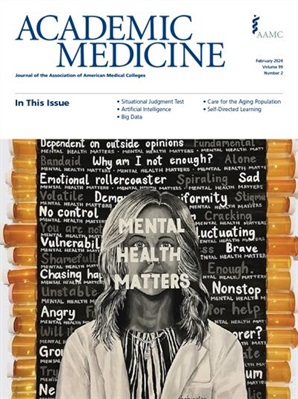针对卫生专业研究生教育课程中的非全日制远程学习者的可扩展辅导模式。
IF 5.3
2区 教育学
Q1 EDUCATION, SCIENTIFIC DISCIPLINES
引用次数: 0
摘要
问题健康职业教育(HPE)研究生项目需要调整指导实践,以支持越来越多的在职成人学习者,尤其是那些非全日制学习者和远程学习者。尽管顾问与被顾问之间的关系对研究生学习者的成功具有公认的重要性,但许多顾问缺乏正规的培训,而且必须管理多个优先完成事项。此外,HPE 研究生指导缺乏既定的循证实践,使得每个项目都在独立开展指导工作。方法2018 年 8 月,统一服务大学卫生职业教育系成立了一个教师小团队,担任学术顾问(n = 7)。这支骨干队伍采用了一种基于 5 项指导实践的指导模式,称为 "全方位指导"(TOTAL Advising)--培训指导教师、学员入职、经常接触、年度审查学员和学员审查。这些指导实践旨在提供一个全方位的支持系统,以确保学习者感到有能力充分参与该计划,同时处理好个人和职业生活的需求。总辅导 "提供了实现 3 个指导性信念所需的框架:每个学习者都有能力完成课程、促进社区发展以及提供清晰的沟通。从中观察到的主题反映了项目的 3 个指导信念。此外,从 2018 年 5 月到 2024 年 5 月,在 574 名注册该计划的学习者中,有 568 人(99%)毕业并获得证书或学位,只有 6 人(1%)退学。下一步TOTAL Advising 的下一步包括对顾问培训计划的有效性进行全面评估,并与其他研究生 HPE 计划合作,分享咨询方面的最佳实践,讨论新出现的挑战,并在更广泛的 HPE 社区中形成咨询实践。本文章由计算机程序翻译,如有差异,请以英文原文为准。
A Scalable Advising Model for Part-Time, Distant Learners in Graduate Health Professions Education Programs.
PROBLEM
There is a need within graduate health professions education (HPE) programs to align advising practices to support an increasing number of working adult learners, especially those studying part-time and from remote locations. Despite the recognized importance of the advisor-advisee relationship in graduate learner success, many advisors lack formal training and have to manage multiple completing priorities. Furthermore, a lack of established evidence-based practices for graduate HPE advising has left each program navigating advising independently.
APPROACH
The Department of Health Professions Education, Uniformed Services University, established a small cadre of faculty to serve as academic advisors (n = 7) in August 2018. This cadre uses an advising model based on 5 advising practices, called TOTAL Advising- train the advisors, onboard the learners, touch base frequently, annually review learners, and learner review. These advising practices are meant to provide a wrap-around support system to ensure learners feel empowered to fully engage in the program, while managing the demands of their personal and professional lives. TOTAL Advising provides the framework needed to achieve 3 guiding beliefs: each learner is capable of completing the program, fostering community, and providing clear communication.
OUTCOMES
Between May 2020-May 2024, learners who completed a degree (n = 21) were interviewed about their advising experiences by a program evaluator after they graduated. The themes observed from these reflect the program's 3 guiding beliefs. Additionally, from May 2018-May 2024, of the 574 learners who enrolled in the program, 568 (99%) graduated with a certificate or degree, only 6 (1%) were disenrolled.
NEXT STEPS
The next steps for TOTAL Advising involve a comprehensive evaluation of the effectiveness of the training program for advisors and collaborating with other graduate HPE programs to share best practices in advising, discuss emerging challenges, and shape advising practices in the broader HPE community.
求助全文
通过发布文献求助,成功后即可免费获取论文全文。
去求助
来源期刊

Academic Medicine
医学-卫生保健
CiteScore
7.80
自引率
9.50%
发文量
982
审稿时长
3-6 weeks
期刊介绍:
Academic Medicine, the official peer-reviewed journal of the Association of American Medical Colleges, acts as an international forum for exchanging ideas, information, and strategies to address the significant challenges in academic medicine. The journal covers areas such as research, education, clinical care, community collaboration, and leadership, with a commitment to serving the public interest.
 求助内容:
求助内容: 应助结果提醒方式:
应助结果提醒方式:


